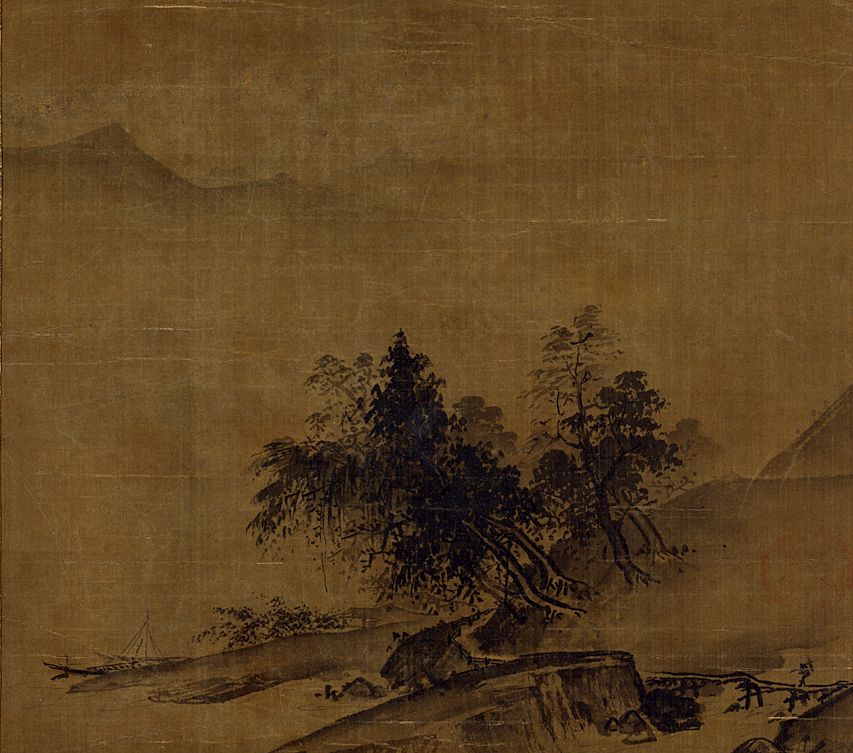broken boat
this whole life a heart set on rivers and seas,
long ago I outfitted a skiff—
not just for sailing up the black mountain stream
or drifting daily close by the brushwood gate—
then a panicked escape from the rebel troops:
heartsick in far lands for my home in the hills—
my neighbors have gone away now too;
only the wild bamboo grows taller, taller—
the boat’s wales no longer resound with my strikes:
it’s buried, cast aside, undergoing autumns—
I look up and watch the wings flying west;
below, I’m shamed by the stream as it flows east—
the old boat could be dug up again;
and a new one wouldn’t be hard to find—
this place of grief, fate has exiled me from it;
it’s hard to stay long in an empty house
Jack Hayes
© 2016
based on Du Fu: 破船
pò chuán
Notes: As always, grateful acknowledgement to my translation partner, Sheila Graham-Smith for her editing & research. Some points about the poem, much of which come from Sheila’s work.
Per Burton Watson, the poem dates to 764 when Du Fu returned to his thatched hut in Chengdu after fleeing a local rebellion. At this point it was eight years after the original An Lushan uprising, which had displaced Du Fu from Chang’an to the south. It’s difficult to comprehend the level of turmoil in China during this time period—not only were there shocking levels of death & destruction, actually approaching the appalling levels of our own time, but in addition there was a massive displacement of people, generally from the north to the south. One reason it’s difficult to assess the mortality levels during the series of revolts is simply because there was so much movement of the population.
Sheila pointed to two tropes within the poem. First, we wanted to underline the identification of the poet with the “broken boat.” The poem begins with Du Fu’s paraphrase of a passage from the Zhuangzi. Here is the passage in the public domain James Legge translation:
Prince Mou of Gong-shan spoke to Zhan-zi, saying, 'My body has its place by the streams and near the sea, but my mind dwells at the court of Wei - what have you to say to me in the circumstances?' Zhan-zi replied, 'Set the proper value on your life. When one sets the proper value on his life, gain seems to him unimportant.' The prince rejoined, 'I know that, but I am not able to overcome (my wishes).' The reply was, 'If you cannot master yourself (in the matter), follow (your inclinations so that) your spirit may not be dissatisfied. When you cannot master yourself, and try to force yourself where your spirit does not follow, this is what is called doing yourself a double injury; and those who so injure themselves are not among the long-lived.'
The turmoil in the wake of the An Lushan rebellion not only displaced Du Fu from his homeland, it also cost him his position at court. He, like the boat, has also been “buried” & “cast off”; in addition, he suffers shame at having run.
In addition, Sheila points to the “empty house” trope, noting that it occurs frequently as a metaphor for depression & heartbreak. Sheila writes, “the meaning of the empty house is double edged. It stands for the absence of a place in the world order, and also for some personal failing. It gives the end result - the man without context - and also gives the cause - his restlessness and inability to stay in one place, embodied in the boat) - in the same metaphor - the empty house.” She also referred to passages both from the great Tang poet Wang Wei & also the poet Zuo Si from the western Jin period.
Flap, flap, the captive bird in the cage
Beating its wings against the four corners.
Depressed, depressed the scholar in the narrow street:
Clasping a shadow, he dwells in an empty house.
Zuo Si, “The Scholar in the Narrow Street”, Arthur Waley translation
I sit alone sad at my whitening hair
Waiting for ten o’clock in my empty house
In the rain the hill fruits fall
Under the lamp grasshoppers sound
White hairs will never be transformed
That elixir is beyond creation
To eliminate decrepitude
Study the absolute.
Wang Wei, “Sitting alone on an Autumn Night”; GW Robinson translation
Image links to its source on Wiki Commons:
Untitled (Landscape): Xia Gui – ink and light colors on silk: Song Dynasty.
Public domain.

No comments:
Post a Comment
Thanks for stopping by & sharing your thoughts. Please do note, however, that this blog no longer accepts anonymous comments. All comments are moderated. Thanks for your patience.